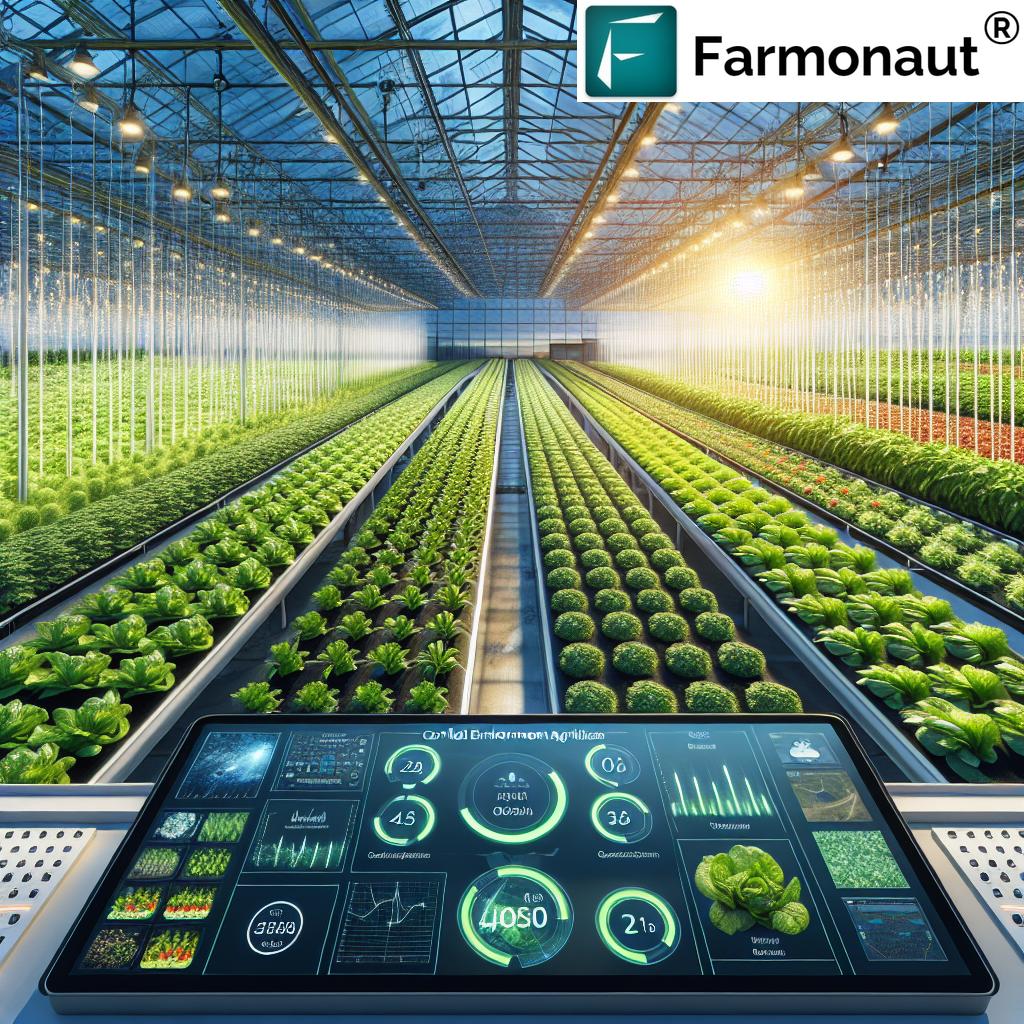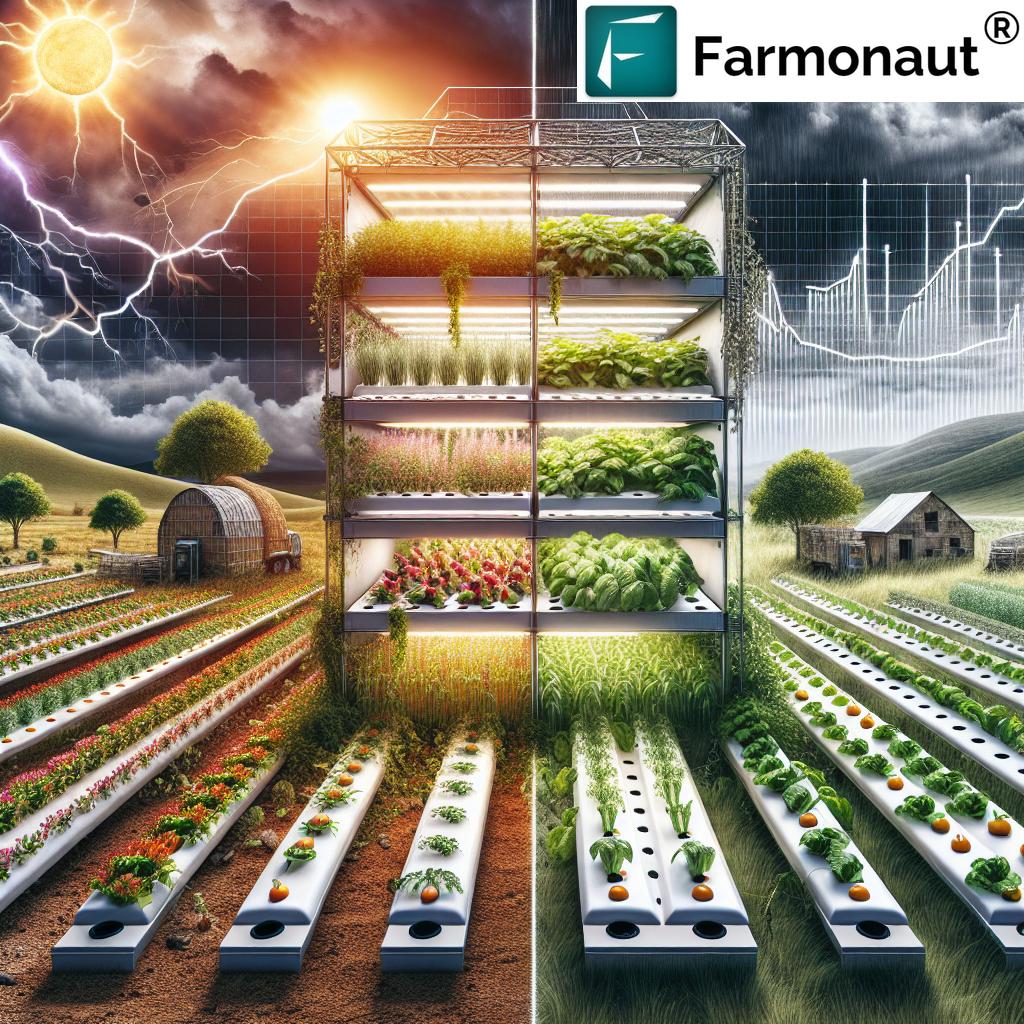Revolutionizing Sustainable Agriculture: New Jersey’s CEA Leader Pioneers Eco-Friendly Farming Innovations
“New Jersey’s CEA leader’s patented greenhouse software optimizes crop yields, revolutionizing sustainable agriculture across 20+ retail locations.”
In the ever-evolving landscape of sustainable agriculture technology, controlled environment agriculture (CEA) has emerged as a game-changing force, reshaping the way we approach food production and distribution. At the forefront of this revolution is Edible Garden AG Incorporated, a New Jersey-based leader in CEA that is setting new standards for eco-friendly farming practices and locally grown organic vegetables.
Today, we’re excited to delve into the groundbreaking innovations and recent accolades that are propelling Edible Garden to the forefront of the sustainable food production industry. From patented greenhouse management software to innovative self-watering display technology, we’ll explore how this pioneering company is addressing global food security challenges while promoting a more sustainable and efficient agricultural ecosystem.
A New Jersey Success Story: Edible Garden’s CEO Recognized for Innovation
The recent recognition of Edible Garden’s CEO, Jim Kras, in the prestigious 2025 NJBIZ Power 100 list marks a significant milestone for the company and the CEA industry as a whole. This annual ranking, curated by NJBIZ, celebrates the most influential business leaders shaping New Jersey’s economy, industries, and communities.
Mr. Kras’s inclusion in this esteemed list is a testament to Edible Garden’s impact on the state’s economic and social landscape. The company’s commitment to revolutionizing sustainable agriculture through technology, innovation, and responsible farming practices has not gone unnoticed.

This recognition follows another recent honor for Mr. Kras, who was named a finalist for the Entrepreneur Of The Year® 2024 New Jersey Award by Ernst & Young (EY US). These accolades underscore the company’s growing influence in the realm of sustainable agriculture and its commitment to driving positive change in the industry.
Pioneering Technologies Driving Sustainable Agriculture
At the heart of Edible Garden’s success lies a suite of innovative technologies that are transforming the way we approach farming and food production. Let’s explore some of the key innovations that are setting this CEA leader apart:
GreenThumb 2.0: Revolutionizing Greenhouse Management
Edible Garden’s proprietary GreenThumb 2.0 software, protected by multiple patents (US Nos.: US 11,158,006 B1, US 11,410,249 B2 and US 11,830, 088 B2), is a game-changer in the world of controlled environment agriculture. This advanced greenhouse management system enhances efficiency and optimizes crop yields through:
- Real-time monitoring of environmental conditions
- Automated adjustment of lighting, temperature, and humidity
- Predictive analytics for crop health and yield forecasting
- Integration with IoT devices for seamless data collection and analysis
By leveraging GreenThumb 2.0, Edible Garden can ensure consistent, high-quality produce while minimizing resource consumption and environmental impact.
Self-Watering Display Technology: Extending Shelf Life and Reducing Waste
Another groundbreaking innovation from Edible Garden is its patented self-watering display technology (U.S. Patent No. D1,010,365). This innovative system is designed to increase plant shelf life and provide an enhanced in-store plant display experience. Key benefits include:
- Extended freshness of produce at retail locations
- Reduced spoilage and waste
- Improved visual appeal of produce displays
- Lower maintenance requirements for retailers
“Innovative self-watering display technology extends organic produce shelf life by up to 300% at retail stores.”
This technology not only benefits consumers by providing fresher, longer-lasting produce but also contributes to Edible Garden’s Zero-Waste Inspired® mission by significantly reducing food waste throughout the supply chain.
Sustainable Farming Practices: The Edible Garden Approach
Edible Garden’s commitment to sustainability goes beyond innovative technologies. The company has implemented a comprehensive approach to eco-friendly farming practices that sets a new standard for the industry:
Zero-Waste Inspired® Mission
At the core of Edible Garden’s operations is its Zero-Waste Inspired® mission. This guiding principle drives the company to minimize waste at every stage of the production and distribution process. Key initiatives include:
- Optimizing resource use in greenhouse operations
- Implementing closed-loop water recycling systems
- Utilizing compostable and recyclable packaging materials
- Developing innovative solutions to reduce food waste at retail locations
Locally Grown, Organic Produce
Edible Garden’s focus on locally grown, organic vegetables not only ensures fresher produce for consumers but also significantly reduces the carbon footprint associated with long-distance transportation. The company’s network of strategically located greenhouses and processing facilities allows for:
- Reduced food miles and associated emissions
- Support for local economies and job creation
- Greater transparency in the supply chain
- Improved food security through distributed production

Vertical Farming Innovations
Edible Garden’s adoption of vertical farming techniques allows for maximized production in limited spaces. This approach offers numerous benefits:
- Increased crop yields per square foot
- Reduced water and land usage
- Year-round production capabilities
- Protection from external environmental factors and pests
By combining these sustainable farming practices with cutting-edge technology, Edible Garden is setting new benchmarks for efficiency, sustainability, and product quality in the CEA industry.
Expanding Product Portfolio: Beyond Fresh Produce
While Edible Garden is primarily known for its fresh, locally grown organic vegetables, the company has strategically expanded its product portfolio to include a range of plant-based nutrition products and innovative food solutions:
Vitamin Way® and Vitamin Whey® Protein Powders
Recognizing the growing demand for plant-based nutrition options, Edible Garden has developed two lines of protein powders:
- Vitamin Way®: A range of plant-based protein powders
- Vitamin Whey®: High-quality whey protein powders
These products complement Edible Garden’s fresh produce offerings and cater to health-conscious consumers looking for sustainable nutrition options.
Kick. Sports Nutrition Line
Targeting the athletic and fitness market, Edible Garden’s Kick. Sports Nutrition line offers premium performance products designed to meet the needs of today’s health-conscious athletes. This product line demonstrates the company’s ability to innovate beyond traditional produce offerings.
Pulp Gourmet Sauces and Chili-Based Products
In a move towards value-added products, Edible Garden has introduced a line of sustainable food flavoring products under the Pulp brand. These gourmet sauces and chili-based products showcase the company’s commitment to reducing waste by utilizing surplus produce in creative ways.
Expanding Retail Network and Distribution
Edible Garden’s innovative products and sustainable practices have led to a rapidly expanding retail footprint. The company’s produce and products are now offered at over 5,000 stores across the United States, marking a significant milestone in its growth trajectory.
This extensive distribution network is supported by:
- Strategic partnerships with major retailers
- Efficient logistics and supply chain management
- Consistent product quality and freshness
- Growing consumer demand for sustainable and locally sourced products
The company’s ability to scale its operations while maintaining its commitment to sustainability and quality is a testament to the effectiveness of its CEA model and innovative technologies.
Comparative Analysis: Traditional vs. CEA Farming Methods
To better understand the impact of Edible Garden’s approach, let’s examine how controlled environment agriculture (CEA) compares to traditional farming methods:
| Farming Aspect | Traditional Farming | CEA Methods | Sustainability Impact |
|---|---|---|---|
| Water Usage | High | Low | Significant water conservation |
| Pesticide Use | Moderate to High | Minimal to None | Reduced environmental contamination |
| Yield per Acre | Variable | Consistently High | Improved land use efficiency |
| Energy Efficiency | Low to Moderate | High | Reduced carbon footprint |
| Growing Season | Limited by climate | Year-round production | Enhanced food security |
| Crop Predictability | Subject to environmental factors | Highly predictable | Reduced food waste |
This comparison clearly illustrates the advantages of CEA methods in terms of resource efficiency, environmental impact, and production consistency. Edible Garden’s adoption of these techniques positions the company at the forefront of sustainable agriculture.
The Future of Sustainable Agriculture: Edible Garden’s Vision
As Edible Garden continues to grow and innovate, the company’s vision for the future of sustainable agriculture is taking shape. Key focus areas include:
Expanding CEA Technologies
Edible Garden is committed to further developing and refining its CEA technologies, including:
- Enhanced AI and machine learning capabilities for GreenThumb software
- Next-generation self-watering display systems
- Advanced sensors and IoT integration for even more precise crop management
Scaling Sustainable Production
The company aims to expand its network of greenhouses and processing facilities, bringing locally grown, organic produce to more consumers across the United States. This expansion will focus on:
- Strategic location selection to minimize transportation distances
- Partnerships with local growers and communities
- Integration of renewable energy sources to power CEA facilities
Innovating for Food Security
Edible Garden recognizes the global challenges of food security and is actively working on solutions, including:
- Development of drought-resistant and high-yield crop varieties
- Research into urban farming solutions for food deserts
- Collaboration with academic institutions on sustainable agriculture research
The Role of Technology in Sustainable Agriculture
As we’ve seen with Edible Garden’s innovations, technology plays a crucial role in advancing sustainable agriculture. Let’s explore some additional technological trends that are shaping the future of farming:
Satellite-Based Crop Monitoring
Advanced satellite technology is revolutionizing the way farmers monitor and manage their crops. Companies like Farmonaut are leveraging satellite imagery and AI to provide valuable insights into crop health, soil moisture levels, and other critical metrics. This technology enables farmers to make data-driven decisions about irrigation, fertilizer usage, and pest management, ultimately optimizing crop yields and reducing resource wastage.
AI-Powered Advisory Systems
Artificial Intelligence is transforming agriculture by providing personalized farm advisory services. These systems analyze vast amounts of data, including satellite imagery, weather forecasts, and historical crop performance, to generate tailored recommendations for farmers. This technology helps improve farm productivity and efficiency while reducing the risk of crop failures.
Blockchain for Supply Chain Transparency
Blockchain technology is being adopted in agriculture to enhance traceability and transparency in supply chains. This is particularly important for organic and sustainably produced foods, as it allows consumers to verify the origin and journey of their produce from farm to table. Implementing blockchain can help build trust, reduce fraud, and ensure fair pricing for farmers.
Precision Agriculture Tools
Precision agriculture technologies, such as GPS-guided tractors, drone-based crop monitoring, and variable rate application systems, are helping farmers optimize their operations. These tools allow for more precise application of inputs like water, fertilizers, and pesticides, reducing waste and environmental impact while improving crop yields.
For those interested in exploring these cutting-edge agricultural technologies, Farmonaut’s web app offers a comprehensive platform for satellite-based farm management and precision agriculture solutions.

The Impact of CEA on Food Security and Sustainability
Controlled Environment Agriculture, as pioneered by companies like Edible Garden, is having a profound impact on food security and sustainability. Let’s examine some of the key benefits:
Year-Round Production
CEA facilities can produce crops year-round, regardless of external weather conditions. This consistency helps stabilize food supplies and prices, reducing the impact of seasonal fluctuations and climate-related disruptions.
Reduced Water Usage
Advanced CEA systems can use up to 90% less water than traditional farming methods. This is particularly crucial in water-stressed regions and contributes significantly to overall water conservation efforts.
Minimized Pesticide Use
The controlled environment in CEA facilities greatly reduces the need for pesticides, resulting in cleaner, healthier produce and minimizing environmental contamination.
Increased Food Safety
By controlling the growing environment and minimizing human handling, CEA methods can significantly reduce the risk of foodborne illnesses and contamination.
Urban Food Production
CEA technologies enable food production in urban areas, bringing fresh produce closer to consumers and reducing transportation-related emissions and costs.
The Role of Consumer Awareness in Driving Sustainable Agriculture
As companies like Edible Garden continue to innovate in the field of sustainable agriculture, consumer awareness and demand play a crucial role in driving industry-wide change. Here’s how consumers are influencing the shift towards more sustainable farming practices:
Demand for Transparency
Consumers are increasingly interested in knowing where their food comes from and how it’s produced. This demand for transparency is pushing companies to adopt technologies like blockchain for supply chain traceability and to provide more detailed information about their farming practices.
Preference for Local and Organic
The growing preference for locally grown and organic produce is encouraging more farmers and companies to adopt sustainable farming methods. This trend supports businesses like Edible Garden that focus on locally grown, organic vegetables.
Concern for Environmental Impact
As awareness of climate change and environmental issues grows, consumers are seeking out products with lower environmental footprints. This is driving innovation in areas like water conservation, reduced pesticide use, and energy-efficient farming methods.
Health and Wellness Focus
The increasing focus on health and wellness is leading consumers to demand fresher, more nutritious produce. CEA methods, which can deliver consistently high-quality, nutrient-rich vegetables, are well-positioned to meet this demand.
For those interested in supporting sustainable agriculture through technology, consider exploring Farmonaut’s mobile apps for both Android and iOS platforms:


The Economic Impact of Sustainable Agriculture
The shift towards sustainable agriculture, as exemplified by Edible Garden’s success, is having a significant economic impact. Let’s explore some of the key economic benefits:
Job Creation
The growth of CEA and sustainable farming practices is creating new job opportunities in areas such as:
- High-tech greenhouse operations
- Agricultural technology development
- Sustainable supply chain management
- Eco-friendly packaging and distribution
Investment in Innovation
The demand for sustainable agriculture solutions is driving investment in research and development. This influx of capital is fueling innovation in areas like:
- Advanced greenhouse technologies
- AI and machine learning for crop management
- Sustainable packaging solutions
- Energy-efficient farming equipment
Cost Savings for Farmers
While initial investments in CEA technologies can be significant, they often lead to long-term cost savings through:
- Reduced water and pesticide usage
- Lower labor costs due to automation
- Increased crop yields and quality
- Year-round production capabilities
Economic Resilience
Sustainable agriculture practices can help build economic resilience by:
- Reducing dependency on imported produce
- Stabilizing food prices through consistent local production
- Creating diverse revenue streams for farmers
- Mitigating the economic impact of climate-related crop failures
For those interested in contributing to the sustainable agriculture movement, Farmonaut’s affiliate program offers an opportunity to earn while promoting innovative farming technologies:
Earn With Farmonaut: Earn 20% recurring commission with Farmonaut’s affiliate program by sharing your promo code and helping farmers save 10%. Onboard 10 Elite farmers monthly to earn a minimum of $148,000 annually—start now and grow your income!
Looking Ahead: The Future of Sustainable Agriculture
As we look to the future, it’s clear that sustainable agriculture, driven by innovations in controlled environment agriculture and technology, will play a crucial role in addressing global food security challenges. Companies like Edible Garden are at the forefront of this revolution, setting new standards for efficiency, sustainability, and product quality.
Key trends to watch in the coming years include:
- Further integration of AI and machine learning in farm management
- Expansion of urban farming initiatives
- Development of more resilient and nutrient-dense crop varieties
- Increased adoption of renewable energy sources in CEA facilities
- Growing consumer demand for transparent, sustainably produced food
As these trends continue to shape the agricultural landscape, we can expect to see more innovations that balance the need for increased food production with environmental stewardship and resource conservation.
Conclusion: A Sustainable Future for Agriculture
The recognition of Edible Garden’s CEO in the NJBIZ Power 100 list is more than just an accolade for one company—it’s a testament to the growing importance and influence of sustainable agriculture in our economy and society. As we face challenges like climate change, population growth, and resource scarcity, innovations in controlled environment agriculture and sustainable farming practices will be crucial in ensuring food security and environmental sustainability.
Companies like Edible Garden, with their commitment to eco-friendly farming practices, locally grown organic vegetables, and innovative technologies, are leading the way towards a more sustainable and efficient agricultural ecosystem. Their success demonstrates that it’s possible to balance profitability with environmental responsibility, setting a new standard for the industry.
As consumers, policymakers, and investors increasingly recognize the importance of sustainable agriculture, we can expect to see continued growth and innovation in this sector. The future of farming is here, and it’s green, efficient, and tech-savvy.
FAQ Section
Q: What is Controlled Environment Agriculture (CEA)?
A: Controlled Environment Agriculture is a technology-based approach to food production that provides protection and maintains optimal growing conditions throughout the development of the crop. It combines horticultural and engineering techniques to optimize plant growth, quality, and yield.
Q: How does CEA contribute to sustainability?
A: CEA contributes to sustainability by significantly reducing water usage, minimizing pesticide use, optimizing energy efficiency, and allowing for year-round production regardless of external climate conditions. This leads to more efficient resource use and reduced environmental impact compared to traditional farming methods.
Q: What are the benefits of locally grown, organic vegetables?
A: Locally grown, organic vegetables offer several benefits, including fresher produce with higher nutritional value, reduced transportation-related emissions, support for local economies, and decreased exposure to synthetic pesticides and fertilizers.
Q: How does Edible Garden’s self-watering display technology work?
A: Edible Garden’s patented self-watering display technology is designed to extend the shelf life of produce at retail locations. While specific details are proprietary, the system likely involves a controlled water supply that keeps plants hydrated without overwatering, maintaining freshness and reducing waste.
Q: What is the Zero-Waste Inspired® mission?
A: The Zero-Waste Inspired® mission is Edible Garden’s commitment to minimizing waste throughout their production and distribution process. This includes optimizing resource use, implementing recycling systems, using sustainable packaging, and developing innovative solutions to reduce food waste at retail locations.




